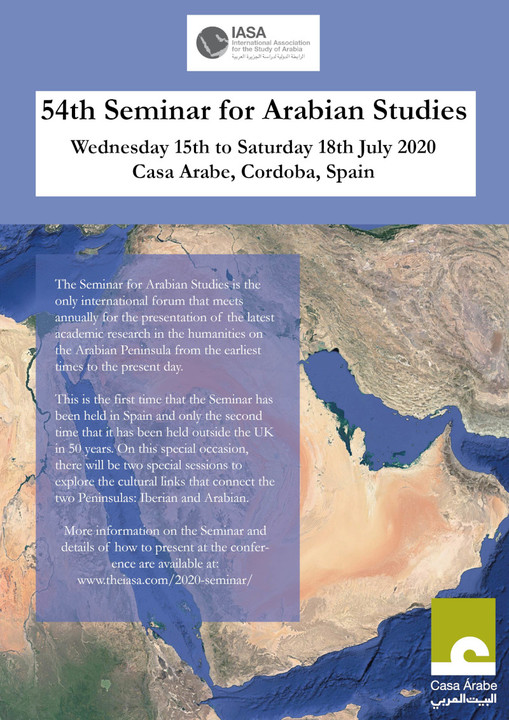Courses and Workshops
Index / Activities / Courses and Workshops / 54th Seminar for Arabian Studies
54th Seminar for Arabian Studies
From February 03, 2020 until April 12, 2020
CóRDOBA
Casa Árabe headquarters (at Calle Samuel de los Santos Gener, 9).
Organized by the International Association for the Study of Arabia
(IASA), it will take place in Casa Arabe (Cordoba, Spain), from 15th to
18th July 2020.
The Seminar for Arabian Studies is an annual international conference for the presentation of the latest academic research on the archaeology, history, epigraphy, languages, literature, art, culture, ethnography, geography, geology and natural history of the Arabian Peninsula (and associated areas), from the earliest times to the present day or, in the case of political and social history, to the end of the Ottoman Empire (1922). The Seminar is open to contributions from any scholars and interested public is welcome to the sessions. For registration and fees, please see further information in the link provided below.
General Sessions.
The core sessions of the Seminar are dedicated to the presentation of the latest research produced in the Arabian Peninsula and associated areas (such as the Iranian coast of the Gulf, the Jordanian Desert, the western coast of the Red Sea or the extensive territories of the Omani empire in the 19th century). This fascinating territory has served as a link of contact between cultures for millennia and witnessed developments that have changed history. In spite of this, the study of Arabia is still young in comparison with those of the rest of the Middle East and each year research offers new surprises. The general sessions of the Seminar cover the latest academic research on the archaeology, history, epigraphy, languages, literature, art, culture, ethnography, geography, geology and natural history of the Arabian Peninsula from the earliest prehistory to the most recent times.
Special Session 1: Intellectual links: language, law, literature, history and geography of Jazirat al-‘Arab in Jazirat al-Andalus.
As in other regions of the Islamic world, in al-Andalus Arabia had an important presence in the writings of its scholars and the imaginaire of its inhabitants. The process of Arabization, the spread of the Maliki legal school with its origins in Medinan legal practice, the literary and historical memory of pre-Islamic Arabia, and the interest for its geography and history against the background of the hajj practices are some of the aspects that have been explored although there is still room for new approaches and perspectives. In this Special Session we invite papers to deepen the study of these and other aspects.
Special Session 2: Comparison of cultural environmental adaptations in the Arabian and Iberian peninsulas.
In this session we aim at discussing diversity in human adaptations to arid environments in the Arabian and Iberian peninsulas. These two peninsulas are both large land masses with a range of geographies and with rich cultural histories. Although they came closely into contact only from the Islamic period onwards they shared similarities in climate, land, and connectivity long before that. This session is intended to allow scholars to present on behavioural strategies developed to cope with the specifics of arid landscapes in both Arabia and Iberia from the early prehistory to modern times. There is particular interest in settlement dynamics, subsistence strategies as well as water control and management from an archaeological point of view, but contributions from other perspectives are also welcome.
Focus Session: Revealing cultural landscapes in northwest Arabia
Saudi Arabia’s first inscribed World Heritage Site, Hegra, Nabataean sister city of Petra, is the best known archaeological site in northwest Saudi Arabia. This session will present latest findings at a broad range of sites in this critical but understudied region of KSA, revealing a rich and complex past through many millennia at various sites. In Spring 2018 an unprecedented integrated archaeological survey was launched in AlUla County, recording all feature types of every time period from the air and on the ground within its 22,561 sq km. Since Autumn 2018 targeted excavations at selected features in the largest category – funerary structures – have resulted in Chalcolithic to Bronze Age dates. Even more significant has been identifying an extraordinary Neolithic ritual monument type and activity within it. Recent fieldwork elsewhere in the region is no less remarkable. A Neolithic site with exceptional life-sized camels in high relief discovered at Sakaka adds an entirely new dimension to the rock art of Saudi Arabia. At Qurayyah both excavations and surveys are proving the formation of the oasis as a walled settlement to be of a significantly older age than previously thought; its long history will be reviewed on the basis of environmental, archaeological and epigraphic data of one landmark feature of the site: the Rock Plateau. Excavations in the settlement of Al-Bad' (ancient Madian) have revealed an extensive and complex history of occupation at the site well beyond that associated with the Nabataean tombs. Together this set of papers presents a range of recent discoveries that clarify the complex richness of life in this pivotal northwest region of the Arabian Peninsula from the early Neolithic through Islamic periods.
For guidelines about the submission of abstracts, please visit www.theiasa.com/2020-seminar/.

